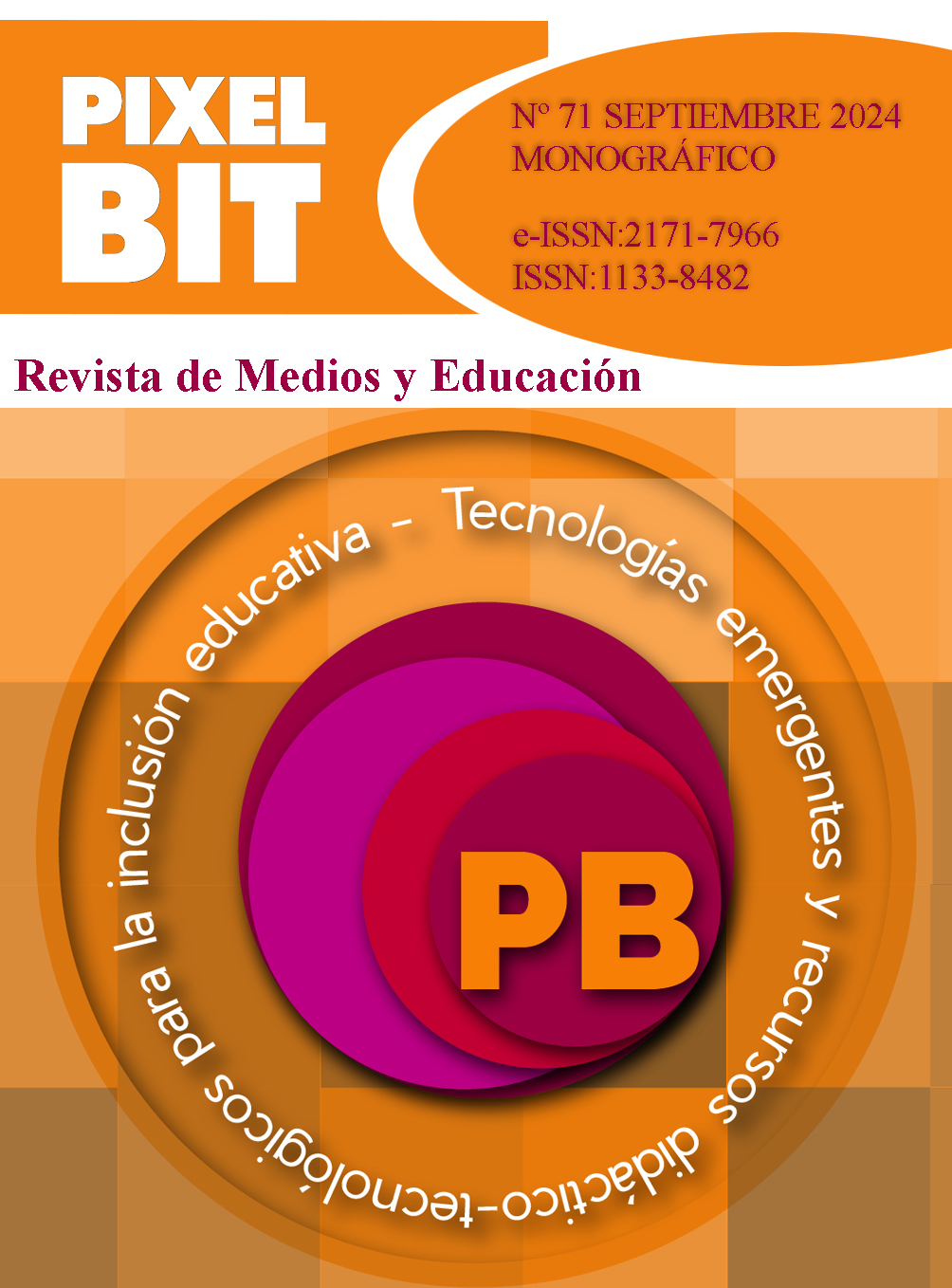Abstract
Changing environments pose challenges for education and, in particular, for the educational inclusion of people with hearing and visual impairments. How can open education and digital and flexible technologies provide avenues for inclusion in the context of complexity? The aim of the study was to analyse possibilities for open education and technologies by identifying current practices, challenges and possibilities, with a view to proposing an inclusive and open model in the framework of complexity for the future of education. The method was research-based design, where questionnaires were administered to 390 participants in the context of an open and inclusive education programme. The data analysis accounts for (a) current practices such as e-books, training courses and sign language; (b) identification of the challenges of quality open educational resources (OER), policies to support inclusion and diversity, and OER sustainability models, to develop accessible and open digital materials; and (c) the components of an open educational model for inclusion that considers strategic elements for the future of education and emerging and innovative technologies. The study is intended to be of value to teachers, trainers, developers, decision-makers, interested in new possibilities for open and inclusive education.
References
Alsalem, M. A., & Alzahrani, H. A. (2023). The Role of Institutional Practice in Promoting Inclusive Education for Deaf and Hard of Hearing Students: A Critical Analysis. SAGE Open, 13(4), 21582440231203435. https://doi.org/10.1177/21582440231203435
Beltrán, J. A., García, R. I., Ramírez-Montoya, M. S., & Tánori, J. (2019). Factores que influyen en la integración del programa de inclusión y alfabetización digital. Revista Electrónica de Investigación Educativa, 21(3), 1-10. Retrieved from: https://redie.uabc.mx/redie/article/view/2088 Retrieved from: https://repositorio.tec.mx/handle/11285/636012
Edelson, D. C. (2002). Design Research: What We Learn When We Engage in Design. Journal of the Learning Sciences, 11(1), 105–121. https://doi.org/10.1207/S15327809JLS1101_4
Escudero-Nahón, A. & Ramírez-Montoya, M.S. (2021). El modelo y sus marcos. En C. M. Vicario, Huerta-Cuervo R., Escudero-Nahón A., Ramírez-Montoya M.S., Espinosa-Díaz y, Solórzano-Murillo M.A.& Trejo-Parada, G.E. (Eds.), Modelo de continuidad de servicios educativos ante un contexto de emergencia y sus etapas de crisis (pp. 19-29). CUDI- ANUIES. Retrieved from: https://hdl.handle.net/11285/63714
Fichten, C., Martiniello, N., Asuncion, N., Coughlan, T., & Havel, A. (2022). Changing Times: Emerging Technologies for Students with Disabilities in Higher Education. https://doi.org/10.13140/RG.2.2.24420.65922
Cruz-Sandoval, M., Vázquez-Parra, J.C, Carlos-Arroyo, M. & Medina-Vidal, A. (2023) Competency-based learning. An approach from the domains of complex thinking competence in a group of Mexican students. European Journal of Contemporary Education, 12(2). 399-412. https://doi.org/10.13187/ejced.2023.2.399 https://hdl.handle.net/11285/651224
Global education monitoring report, 2020: Inclusion and education: All means all—UNESCO Digital Library. (s. f.). Recuperado 24 de diciembre de 2023, de https://unesdoc.unesco.org/ark:/48223/pf0000373718
Joy, J., Balakrishnan, K., & Madhavankutty, S. (2022). SignText: A web-based tool for providing accessible text book contents for Deaf learners. Universal Access in the Information Society, 21(3), 717-723. https://doi.org/10.1007/s10209-021-00801-7
Kocdar, S., & Bozkurt, A. (2023). Supporting Learners with Special Needs in Open, Distance, and Digital Education. En O. Zawacki-Richter & I. Jung (Eds.), Handbook of Open, Distance and Digital Education (pp. 881-895). Springer Nature Singapore. https://doi.org/10.1007/978-981-19-2080-6_49
Kuykendall, K. (2022). New Report from Global Google Research Project Considers the 'Future of Education'. THE Journal. Retrieved from: https://bit.ly/4amOuag
Matjila, T. N. (2023). Evaluation of student support services at an open distance and e-learning university: Towards a framework for students who are deaf and hard of hearing [Thesis]. https://uir.unisa.ac.za/handle/10500/30144
Moraiti, I., Fotoglou, A., Dona, K., Katsimperi, A., Tsionakas, K., & Drigas, A. (2022). IoT in Special Education. Technium Social Sciences Journal, 30, 55. https://heinonline.org/HOL/Page?handle=hein.journals/techssj30&id=56&div=&collection=
Ramírez-Montoya, M.S. (2010). Modelos de enseñanza y método de casos. Trillas
Ramírez-Montoya, M. S., McGreal, R. & Obiageli Agbu, J.F. (2022). Horizontes digitales complejos en el futuro de la educación 4.0: luces desde las recomendaciones de UNESCO [Complex Digital Horizons in the Future of Education 4.0: Insights from UNESCO Recommendations]. RIED-Revista Iberoamericana de Educación a Distancia, 25(2). https://doi.org/10.5944/ried.25.2.33843
Ramírez Montoya, M. S., Stracke, C. M., Chander Sharma, R., Bozkurt, A., Burgos, D., Swiatek Cassafieres, C., Inamorato dos Santos, A., Mason, J., Ossiannilsson, E., Santos Hermosa, G., Gon Shon, J., Wan, M., Obiageli Agbu, J. F., Farrow, R., Karakaya, Ö., Nerantzi, C., Conole, G., Truong, V., & Cox, G. (2022). Impact of COVID-19 on Formal Education: An International Review of Practices and Potentials of Open Education at a Distance. https://doi.org/10.19173/irrodl.v21i3.4659
Ramirez-Montoya, M. S., Anton-Ares, P., & Monzon-Gonzalez, J. (2021). Technological Ecosystems That Support People With Disabilities: Multiple Case Studies. Frontiers in Psychology, 12. https://www.frontiersin.org/articles/10.3389/fpsyg.2021.633175
Smith, L. M. (1990). Ethics, field studies, and the paradigm crisis. En E. Guba (Coord.) The paradigm dialog (pp. 139-157). Sage.
Suárez-Brito, P.; Baena-Rojas, J.; López-Caudana, E.; Glasserman-Morales, L. (2022). Academic literacy as a component of complex thinking in higher education: A scoping review. European Journal of Contemporary Education 11(3), 931-945. https://doi.org/10.13187/ejced.2022.3.931 https://hdl.handle.net/11285/649750
Thammetar, T., & Khlaisang, J. (2019). Promoting Open Education and MOOCs in Thailand. In K. Zhang, C. J. Bonk, T. C. Reeves, & T. H. Reynolds (Eds.), MOOCs and Open Education in the Global South (1st ed., pp. 140–155). Routledge. https://doi.org/10.4324/9780429398919-16
Trewin, S., Basson, S., Muller, M., Branham, S., Treviranus, J., Gruen, D., Hebert, D., Lyckowski, N., & Manser, E. (2019). Considerations for AI fairness for people with disabilities. AI Matters, 5(3), 40-63. https://doi.org/10.1145/3362077.3362086
UNESCO (2021). Avances recientes de la Comisión Internacional sobre los Futuros de la Educación. Comisión Internacional sobre los Futuros de la educación. Retrieved from: https://unesdoc.unesco.org/ark:/48223/pf0000375746_spa
Weber, J.C. (2021a). E-Book Creation - Current Considerations for Deaf and Hard of Hearing (DHH) Students. In Open and inclusive education: WUN and UNESCO training & research networks [OpenEd Programme]. https://www.wununesco.world/keynote1-joanne?lang=en
Weber, J.C. (2021b). The use of Open Educational Access publishing platforms to create e-books for the deaf and hard of hearing. In Open and inclusive education: WUN and UNESCO training & research networks [OpenEd Programme]. https://www.wununesco.world/keynote2-joanne?lang=en
Weber, J., & Skyer, M. (2022). The Aesthetics of OER, Deaf Pedagogy, and Curriculum Design Contra the “Wicked” Policy of Deaf Education. RIED-Revista Iberoamericana de Educación a Distancia, 25(2). https://doi.org/10.5944/ried.25.2.33083

This work is licensed under a Creative Commons Attribution-NonCommercial-NoDerivatives 4.0 International License.
Copyright (c) 2024 Pixel-Bit. Media and Education Journal

